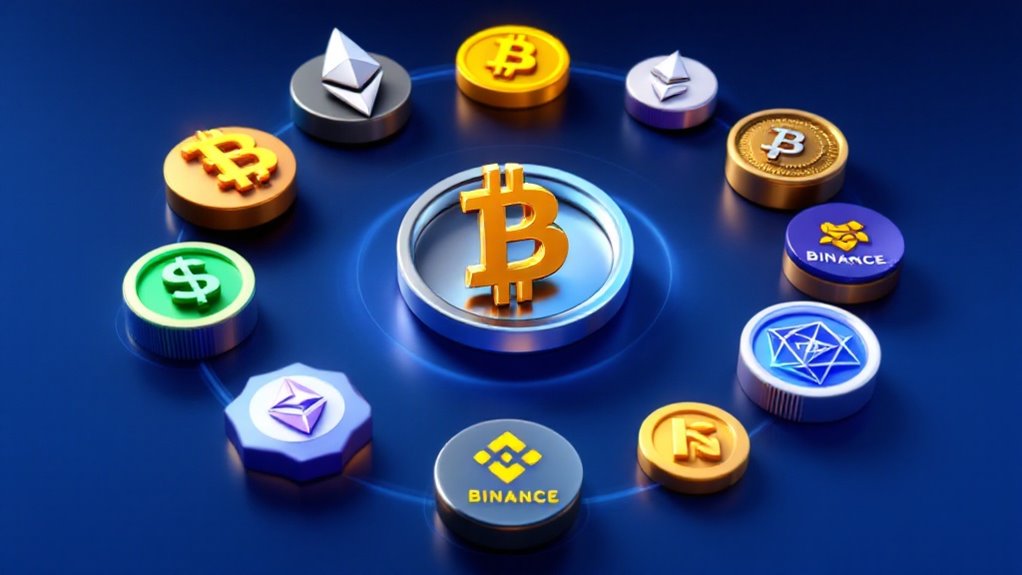Bitcoin reigns supreme in the cryptocurrency market with a staggering $1.66 trillion market cap, followed by Ethereum at $292.60 billion. Tether provides stability at $118 billion, while BNB commands $85.89 billion. Solana's speed attracts $68.49 billion, and Cardano's methodical approach secures $26.96 billion. These digital titans, alongside XRP and emerging altcoins, form the backbone of a transformative $2.5 trillion ecosystem. The deeper one ventures into this digital frontier, the more fascinating patterns emerge.

The dizzying world of cryptocurrencies has evolved far beyond its humble Bitcoin beginnings, with ten digital assets now dominating the landscape of this $2.5 trillion market.
Like a digital gold rush, Bitcoin leads the charge with a staggering $1.66 trillion market cap, having ridden a roller coaster from $40,000 to $94,000 in 2024, before settling at $84,043 in early 2025. Its limited supply of 21 million coins continues to fuel its narrative as digital gold for the modern era.
Bitcoin's meteoric rise mirrors the gold rushes of old, transforming digital scarcity into trillion-dollar value in the modern financial frontier.
In Bitcoin's wake, Ethereum has carved out its own empire as the backbone of the NFT and DeFi revolution, commanding a $292.60 billion market cap. With a current price of $2,068 per token, Ethereum continues to attract developers and investors alike. Regulatory clarity is expected to further boost institutional confidence in the platform by 2025.
Think of it as the bustling metropolis where digital artists and financial innovators gather, even as it grapples with fierce competition from younger, faster blockchains.
Tether, the steady harbor in crypto's stormy seas, maintains its dollar peg with military precision, offering traders a $118 billion safe haven when markets turn turbulent. The stablecoin has shown remarkable stability with a YTD gain of 0.14%.
BNB, the native token of the Binance ecosystem, has transformed from a simple utility token into a $85.89 billion powerhouse.
Like a well-oiled machine, its regular burn events steadily reduce supply while powering an entire universe of decentralized applications.
Meanwhile, Solana has emerged as the Ferrari of blockchains, with its blazing-fast transactions and growing ecosystem across gaming, DeFi, and NFTs, securing a robust $68.49 billion market cap.
XRP and Cardano round out the top contenders, each bringing unique flavors to the crypto feast.
XRP, despite its regulatory wrestling match with the SEC, has surged 14.2% in 2025, while Cardano's methodical, peer-reviewed approach to blockchain development has earned it a devoted following and a $26.96 billion market cap.
Together, these digital assets paint a picture of a maturing market where innovation meets institutional adoption, though seasoned observers know that in crypto's wild west, today's giants could be tomorrow's cautionary tales.
Frequently Asked Questions
How Do I Protect My Cryptocurrency Investments From Hackers and Scams?
Cryptocurrency investors should utilize hardware wallets, enable two-factor authentication, practice strong password security, avoid public networks, and remain vigilant against scams. Regular software updates and offline storage provide additional protection against threats.
What Tax Implications Should I Consider When Trading Cryptocurrencies?
Cryptocurrency trades trigger capital gains taxes. Transactions must be reported for tax purposes. Short-term gains face higher rates than long-term holdings. Detailed records of all trades, including cost basis, are essential for compliance.
Which Cryptocurrency Exchanges Are Considered the Most Reliable and Secure?
Kraken, Gemini, and Coinbase are widely recognized as the most secure cryptocurrency exchanges, offering robust security measures, regulatory compliance, insurance protection, and proven track records of safeguarding user assets.
How Do Cryptocurrency Transaction Fees Compare Between Different Coins?
Transaction fees vary considerably across cryptocurrencies. NANO offers zero fees, while XLM and TRX maintain minimal costs. Bitcoin and Ethereum have higher fees, especially during network congestion, ranging from $1 to $60+.
Can I Mine Cryptocurrencies Using My Personal Computer at Home?
Yes, home computers can mine certain cryptocurrencies like Monero, Ravencoin, and Vertcoin. However, profitability depends on hardware specifications, electricity costs, and mining difficulty. Basic requirements include decent CPU/GPU and adequate cooling.









